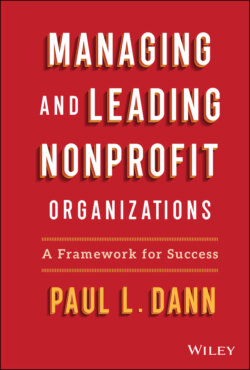Читать книгу Managing and Leading Nonprofit Organizations - Paul L. Dann - Страница 18
Become an Advocate for Leadership Development Practice
ОглавлениеAs you strive to pursue as well as enhance your organization's leadership and engagement opportunities, I want to be sure that you prepare yourself to become a wholly committed advocate. An advocate not only for your own leadership practice but also at an organizational level as well. Building leadership practice for yourself and for the team is something that must be intentional and the desire to develop yourself and the team around you must be articulated. Advocates give voice to a cause that without their public support might not become a reality. Similarly, you must give voice to the desire to develop your leadership skills. This is true as well for those who hope to grow leadership capacity within the organization.
I recall early on in my career having the flawed belief that if I worked hard and developed myself that someone would notice, and I would be provided with greater leadership responsibility. It did not take long before I realized that no one truly noticed. They did appreciate all that I would do, but simply thought I was content with the status quo and had no idea that I had a vision of where my leadership journey might go. Once I started to say affirmatively that I desired to grow as a leader and have greater responsibility, then people began to intentionally consider how I could contribute to new efforts that would represent a greater and more in‐depth leadership role.
It is also critical to advocate for leadership practice across the entire organization. If you do not articulate the importance of everyone developing their capacity to share in leadership practice, then you will have a hard time establishing an agencywide leadership development perspective. Other norms or patterns of behavior can take hold that could ultimately hurt the agency's capacity to be a place that is vibrant and, as Raelin (2011) would say, Leaderful.
Within organizational life there are multiple places where your advocacy can pay off. Annual evaluations become a time when future goals and professional development can be clearly articulated. If you desire future leadership responsibility and growth this is a perfect place to articulate how you hope to grow. Regular meetings with your supervisor become a natural place to talk about future goals as well as professional growth and development. Consider training opportunities that are geared toward your leadership development, as well.
As you pursue each of these strategies, recall the practice perspectives we explored earlier in this chapter. Be sure to have the long view in mind, do not forget to enjoy the journey, remember to use your compass to stay focused on your True North, and be sure to leverage serendipity. For example, you might say if you write about your desire to have more leadership responsibility in your annual evaluation that your current supervisor will see this as a threat. First, my condolences for having a supervisor with this view, but beyond that recognize that this individual is a point in time in your journey and there are other strategies to pursue in your development. While you will encounter obstacles in your leadership journey, your practice perspectives make it possible to pivot around just such a barrier. We know because we have taken the long view that our tenacious nature will help to overcome each challenge that is encountered.
